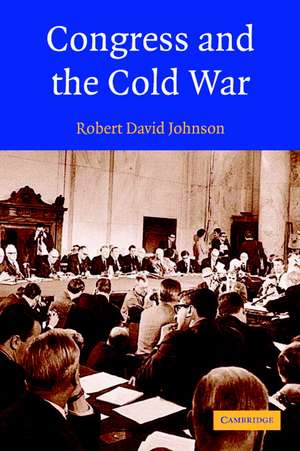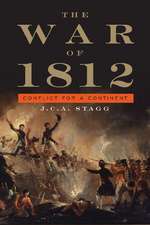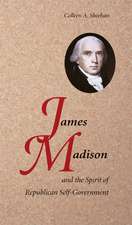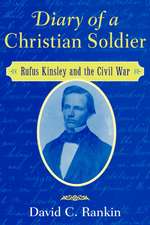Congress and the Cold War
Autor Robert David Johnsonen Limba Engleză Paperback – 20 noi 2005
Preț: 284.11 lei
Nou
Puncte Express: 426
Preț estimativ în valută:
54.36€ • 56.91$ • 44.98£
54.36€ • 56.91$ • 44.98£
Carte tipărită la comandă
Livrare economică 07-21 aprilie
Preluare comenzi: 021 569.72.76
Specificații
ISBN-13: 9780521528856
ISBN-10: 0521528852
Pagini: 382
Ilustrații: Illustrations
Dimensiuni: 153 x 229 x 21 mm
Greutate: 0.51 kg
Editura: Cambridge University Press
Colecția Cambridge University Press
Locul publicării:New York, United States
ISBN-10: 0521528852
Pagini: 382
Ilustrații: Illustrations
Dimensiuni: 153 x 229 x 21 mm
Greutate: 0.51 kg
Editura: Cambridge University Press
Colecția Cambridge University Press
Locul publicării:New York, United States
Cuprins
1. Constructing a bipartisan foreign policy; 2. Legislative power and the congressional right; 3. Redefining congressional power; 4. The consequences of Vietnam; 5. The transformation of Stuart Symington; 6. The new internationalists' congress; 7. The triumph of the armed services committee.
Recenzii
"For decades, historians and political scientists have ignored the pivotal role of Congress in shaping the politics of the Cold War. They will no longer be able to do so. By redefining congressional power, and revealing the numerous ways through which legislators pushed and pulled national defense policies, Johnson offers an exciting, well-researched, and first-rate piece of political history. This outstanding work should be on the bookshelves of everyone who is interested in the story of American politics since WWII." Julian Zelizer, Boston University and author of The American Congress: The Building of Democracy
"Robert David Johnson explodes the myth that Congress took a backseat to the presidency during the Cold War. His sweeping panorama of second half of the twentieth century portrays a feisty institution that seriously questioned and challenged the diplomatic and military policies of a succession of presidents. Here is an astute analysis of our system of checks and balances." Donald A. Ritchie, author of Reporting from Washington: The History of the Washington Press Corps
"A necessary addition to all college and university libraries." -- Choice
"Robert David Johnson has produced a carefully argued and through reassessment of the role played by Congress...This is a fascinating volume:it throws considerable light on the workings of the Constitution."
Peter Lowe, American Historical Review
"A notably detailed and accomplished history of much that unfolded on Capitol Hill with great significance for U.S. policies abroad...it moves scholars closer to being able to construct a genuinely balanced history of the U.S. governments relations with its allies, rivals and enemies during a tense era."
Davis M. Barrett, Journal of Cold War Studies
"Congress and the Cold War is clearly an exceptional piece of historical research, ably addressing in its broad sweep such additional topics such as the critical role of personalities, the turf wars among several important committees...and the double-edged sword of increased House influence in foreign affairs."
Dennis M. Foster, The Review of Politics
2007 Outstanding Academic Title -- Choice Magazine
"Robert David Johnson explodes the myth that Congress took a backseat to the presidency during the Cold War. His sweeping panorama of second half of the twentieth century portrays a feisty institution that seriously questioned and challenged the diplomatic and military policies of a succession of presidents. Here is an astute analysis of our system of checks and balances." Donald A. Ritchie, author of Reporting from Washington: The History of the Washington Press Corps
"A necessary addition to all college and university libraries." -- Choice
"Robert David Johnson has produced a carefully argued and through reassessment of the role played by Congress...This is a fascinating volume:it throws considerable light on the workings of the Constitution."
Peter Lowe, American Historical Review
"A notably detailed and accomplished history of much that unfolded on Capitol Hill with great significance for U.S. policies abroad...it moves scholars closer to being able to construct a genuinely balanced history of the U.S. governments relations with its allies, rivals and enemies during a tense era."
Davis M. Barrett, Journal of Cold War Studies
"Congress and the Cold War is clearly an exceptional piece of historical research, ably addressing in its broad sweep such additional topics such as the critical role of personalities, the turf wars among several important committees...and the double-edged sword of increased House influence in foreign affairs."
Dennis M. Foster, The Review of Politics
2007 Outstanding Academic Title -- Choice Magazine
Notă biografică
Descriere
This book offers the first historical study of the congressional response to the entire Cold War.














